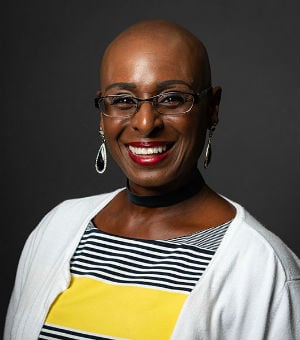
She didn’t think it would happen, teaching for her alma mater, “never in a million years.”
Dr. Gwendolyn L. Neal left A-State with her BSE and MSE in the early nineties. Back then, she didn’t plan to continue her education. “When I walked across that stage with my master’s, I was pregnant with our first child and I was quite content to continue as a classroom teacher,” she said.
Dr. Neal majored in special education, or SpEd, as it’s often called. At first, she taught for the Jonesboro School District, but then she and her family moved to Tennessee. She kept working in the classroom before transitioning into other roles. “I started working in early childhood, with children who’d been identified as developmentally delayed,” Dr. Neal explained. “I was going into the home and working with those mamas.”
By the time Dr. Neal considered going back for another degree, nearly a decade had passed since she’d walked the A-State stage. This time around, she majored in educational leadership, completing her doctor of education in 2008. “It’s challenging coming back at any stage in your life,” she said. Dr. Neal knows what it’s like to balance a career, family and grad school, so she makes it a point to be there for her students. “Not only am I their professor, I’m an advocate for them. A support system.”
A three-time A-State graduate, Dr. Neal now teaches in her alma mater’s Master of Science in Education (MSE) in Special Education – Instructional Specialist K-12 online program.
It’s Personal
Health and developmental issues run in Dr. Neal’s family. Her father suffered from spina bifida, and that’s what drew her to SpEd. “I had a very vested interest in working with those who don’t normally fit in,” she said.
Graduate students often choose special education for the same reason as Dr. Neal, a deeply personal connection. They come to it “because a child or grandchild has a disability or impairment,” she explained. “They have some kind of personal influence, or it’s impacted them in such a way they feel they can help. They can empathize with those who are directly impacted.”
While many are called to serve, school districts still struggle to meet demand. There’s a shortage of SpEd teachers in Arkansas and across the United States, Dr. Neal said. “It’s what districts are looking for.”
Serving the Community
Special education is all about serving community. As Dr. Neal put it, “I’m a servant, and the teachers I serve are servants to the population.” Dr. Neal’s ethos shapes her curriculum, ensuring that students gain the tools they need to excel as SpEd teachers. “I want them to know what the latest methods are,” she said. “I want them to know what the research supports. I want them to know best practices.”
Even the projects grad students complete are designed to positively impact children. Dr. Neal explained that SpEd teachers-in-training “do a task analysis where they select a goal one of their students may have. They write out a plan and break down what’s required into measurable, obtainable steps. It could be something as simple as brushing your teeth or as complex as going to the grocery store and picking out items from your list.”
Dr. Neal’s master’s degree students also complete case studies in SpEd classrooms. They write lesson plans, implement them, and record their efforts. “They share it with me so I can go in and watch, give feedback. Then we come together, and we talk about what they learned and how it benefited the child.”
Sharing Perspectives
One of the best parts of teaching online is bringing graduate students together throughout the country. The shared perspectives give each class a greater depth. “When we get students from New York they shed a different light,” Dr. Neal said. “It’s nice, during discussion boards, for them to say, ‘Hey, this is what we’re doing in our severe and profound category.’ And then you have a different dynamic coming from our candidates that are out west in California.”
Exchanging ideas is just one important aspect of support for SpEd teachers-in-training. This community-focused spirit extends beyond the online classroom. Teaching SpEd is “going to be a challenge,” Dr. Neal said, so “be involved in the field, always. You need to have your contact with the classroom and you need a support system. Individuals who have gone through it or are in it right now. That’s very important.”
Coming Together
Dr. Neal’s been committed to special education throughout her career. After all, she’s an associate professor for the very same degree she earned 25 years ago. The curriculum has since evolved and the format has moved online, but A-State’s focus on community remains the same. “The faculty is invested, totally, in our students, in the program itself, and in one another,” said Dr. Neal. “We have a good support system and we extend that to our students, even more so because we’re online.”
Service and community are the watchwords of Dr. Neal’s career, guiding her from her first elementary school classroom in Jonesboro to her next graduate cohort at A-State. “We all learn differently,” she said. “We may not all be able to do the same things in the same way, but there are things we can do and things that we excel in, and you find that for each individual that you serve.”
Learn more about A-State’s MSE in Special Education – Instructional Specialist K-12 online.